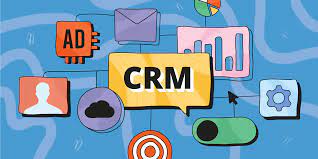In today’s fast-paced business landscape, building and maintaining strong relationships with customers is paramount to success. That’s where Customer Relationship Management (CRM) comes into play. CRM systems have evolved to become invaluable tools for businesses of all sizes, enabling them to streamline processes, enhance customer interactions, and boost overall profitability. In this article, we will explore the concept of CRM and delve into its immense potential in transforming the way companies engage with their customers.
- Understanding CRM:
Customer Relationship Management, or CRM, refers to a comprehensive approach to managing interactions and relationships with existing and potential customers. It involves utilizing technology and data to organize, automate, and synchronize sales, marketing, customer service, and support activities. The goal of CRM is to optimize customer satisfaction, increase customer loyalty, and ultimately drive revenue growth.
- Key Benefits of CRM:
a) Enhanced Customer Insights: CRM systems capture and analyze vast amounts of customer data, providing businesses with valuable insights into their preferences, behavior patterns, and buying habits. These insights enable personalized marketing campaigns, targeted cross-selling and upselling, and improved customer segmentation.
b) Streamlined Sales Processes: CRM platforms offer sales teams a centralized hub for managing leads, contacts, and opportunities. Automation features, such as task reminders and follow-up notifications, ensure sales representatives never miss a crucial interaction, resulting in improved conversion rates and shorter sales cycles.
c) Improved Customer Service: CRM systems enable businesses to provide exceptional customer service by offering a 360-degree view of each customer’s interaction history. Customer service representatives can quickly access relevant information, resolve issues promptly, and provide personalized support, leading to higher customer satisfaction levels.
d) Efficient Marketing Campaigns: With CRM, marketers can develop targeted campaigns based on customer preferences and past interactions. By leveraging automation and segmentation tools, businesses can deliver the right message to the right audience at the right time, increasing the effectiveness of marketing efforts and driving higher conversion rates.
e) Strengthened Collaboration: CRM platforms facilitate seamless collaboration across departments, breaking down silos and enabling teams to work together towards a common goal. Improved communication and data sharing lead to more informed decision-making, fostering a culture of collaboration within the organization.
- Choosing the Right CRM System:
When selecting a CRM system, it’s crucial to consider the specific needs and goals of your business. Factors such as scalability, integration capabilities, customization options, and ease of use should be taken into account. It’s also essential to evaluate the vendor’s reputation, customer support, and security measures to ensure a reliable and secure CRM solution.
- The Future of CRM:
As technology continues to advance, the future of CRM holds even more promise. Artificial Intelligence (AI) and machine learning algorithms are being integrated into CRM systems, enabling predictive analytics, automated lead scoring, and personalized customer experiences. Additionally, CRM is evolving beyond traditional customer-centric approaches and expanding into areas such as partner relationship management, employee engagement, and supplier management, fostering stronger relationships across all facets of business operations.
Conclusion:
CRM has revolutionized the way businesses engage with their customers. By harnessing the power of data and technology, CRM systems offer invaluable tools to optimize sales processes, enhance customer experiences, and drive overall business growth. As companies recognize the importance of customer relationships in a highly competitive market, CRM becomes an indispensable asset for building customer loyalty, increasing profitability, and staying ahead of the competition. Embracing CRM is not just a business strategy; it’s a mindset shift towards prioritizing the needs and satisfaction of your most valuable asset – the customer.


 WhatsApp us
WhatsApp us